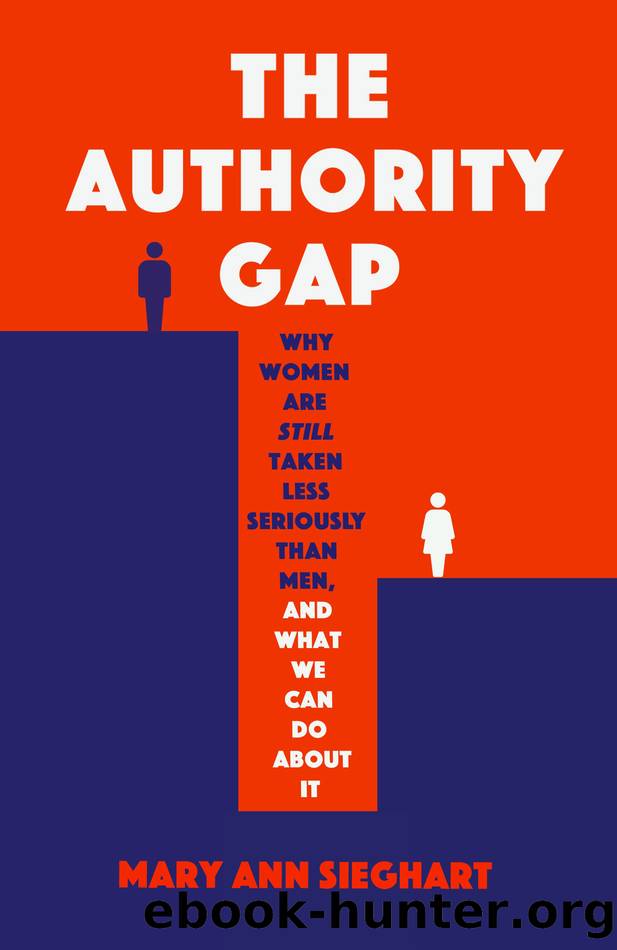The Authority Gap: Why Women Are Still Taken Less Seriously Than Men, and What We Can Do About It by Mary Ann Sieghart

Author:Mary Ann Sieghart [Sieghart, Mary Ann]
Language: eng
Format: epub
Tags: Social Science, Feminism & Feminist Theory, Women's Studies, Gender Studies, Research, Technology & Engineering, Social Aspects, sociology, General, science, Philosophy & Social Aspects
ISBN: 9781473588011
Google: ZOj9DwAAQBAJ
Publisher: Transworld
Published: 2021-07-01T23:52:57.483746+00:00
11
Lady Macbeth meets Medusa
Why do we hate women in power?
âItâs not easy to be a woman in politics. Thatâs an understatement. It can be excruciating, humiliating. The moment a woman steps forward and says, âIâm running for office,â it begins: the analysis of her face, her body, her voice, her demeanor; the diminishment of her stature, her ideas, her accomplishments, her integrity. It can be unbelievably cruel.â
â Hillary Clinton
JADRANKA KOSOR, CROATIAâS first â and so far only â female prime minister since it became a democracy, came to power in 2009 when her predecessor stood down suddenly. I went to visit her in Zagreb and found her still bitter about the whole experience. She believes that a vile thread of misogyny ran through her treatment by both politicians and the media. From the start, they were convinced that she would be useless. They couldnât believe that a woman could lead them out of their economic and diplomatic travails.
âThe very moment I became Prime Minister, I was met with derision and disbelief,â she told me. âHow was she going to be able to do this? At the time, Croatia was in the throes of the financial crisis. GDP had fallen by almost 10 per cent and I was met with disbelief. People were saying, âShe wonât be able to get us out of this crisis, sheâll lead us into complete failure.â The day when I was chosen in the Parliament, there were many insults hurled at me, particularly regarding me as a woman, not as a politician.â1
The derision spread beyond Croatia to the European Union, where negotiations for Croatia to join the EU had become gridlocked. âAt the time, the head of the European Commission was José Manuel Barroso, and during our first meeting he also expressed disbelief. Slovenia and some other European countries were blocking negotiations for Croatia joining the European Union. Mr Barroso literally looked me up and down and asserted that my predecessor, who was a man, couldnât do it, so he didnât think there was any way I could.â
Within three months, Kosor had unblocked the negotiations and secured Croatiaâs entry to the EU. She turned out to be a tough and skilful negotiator, and formed an unexpectedly successful relationship with the Slovenian prime minister, who had previously fought to keep Croatia out of the EU.
If we are resistant to according women equal authority for their expertise, itâs as nothing compared to our resistance to women exercising authority in the form of power. Although I am mainly focusing on female political leaders in this chapter, there is a similar pattern to our attitudes to women with power in any field.
You only have to look at Hillary Clintonâs experience running against Donald Trump in the 2016 US election to see the extent of societyâs toxic misogyny when there was a prospect of having a female president. Hillary Clinton was publicly criticized for all manner of things: her voice was wrong, her hair was wrong, her clothes were wrong, her
Download
This site does not store any files on its server. We only index and link to content provided by other sites. Please contact the content providers to delete copyright contents if any and email us, we'll remove relevant links or contents immediately.
Machine Learning at Scale with H2O by Gregory Keys | David Whiting(4296)
Never by Ken Follett(3937)
Harry Potter and the Goblet Of Fire by J.K. Rowling(3848)
Unfinished: A Memoir by Priyanka Chopra Jonas(3382)
Fairy Tale by Stephen King(3370)
The Man Who Died Twice by Richard Osman(3072)
Will by Will Smith(2911)
Rationality by Steven Pinker(2352)
It Starts With Us (It Ends with Us #2) by Colleen Hoover(2345)
Can't Hurt Me: Master Your Mind and Defy the Odds - Clean Edition by David Goggins(2324)
The Dark Hours by Michael Connelly(2300)
The Storyteller by Dave Grohl(2229)
Friends, Lovers, and the Big Terrible Thing by Matthew Perry(2219)
The Dawn of Everything: A New History of Humanity by David Graeber & David Wengrow(2197)
The Becoming by Nora Roberts(2189)
The Stranger in the Lifeboat by Mitch Albom(2113)
Cloud Cuckoo Land by Anthony Doerr(2104)
Love on the Brain by Ali Hazelwood(2062)
Einstein: His Life and Universe by Walter Isaacson(2012)
